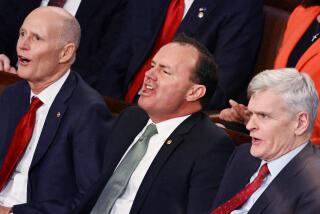Santorum Puts Rate Hike on Table
WASHINGTON — Sen. Rick Santorum, the conservative from Pennsylvania who ranks third in the Senate Republican leadership, said Sunday that he was willing to discuss increasing the Social Security tax rate as a way of helping to assure the program’s solvency.
Santorum said on NBC’s “Meet the Press” that raising the Social Security payroll tax might be the price Republicans have to pay for Democratic support for diverting some of the tax revenue to private retirement accounts, as President Bush has proposed.
Santorum’s comments on raising the Social Security payroll tax rate come at a time when the public appears to be reacting negatively to Bush’s private accounts. In holding out an olive branch to Democrats, Santorum’s position went one step further than the president’s.
Bush last month said he would consider raising the cap on annual wages subject to the tax, but he has repeatedly ruled out an increase in the tax rate. Social Security is supported by a 12.4% tax, shared equally by employer and employee, on the first $90,000 of annual wages.
Santorum, who is chairman of the Senate Republican Conference, said the one issue that he would not negotiate with Democrats was his -- and Bush’s -- insistence that there be no benefit cuts for today’s retirees and workers 55 and older.
“The president has also said we shouldn’t have any kind of [tax] rate increase,” he said. “But I’m sitting down and negotiating with Democrats in the Senate, and what I’ve said is I can’t expect them to come to the table with everything on the table unless I come to the table with everything on the table.”
Santorum’s posture differs sharply from that of House Republican leaders, who immediately rejected Bush’s suggestion that the wage base was open to discussion. “The Republican House didn’t come here to raise taxes,” House Majority Leader Tom DeLay of Texas said Feb. 18.
Senate Republicans have always been more flexible on the wage cap. Sen. Lindsey Graham of South Carolina has proposed raising it as high as $200,000 if doing so would get Democratic support in the Senate for diverting some payroll tax revenue to private Social Security accounts that workers could set aside for their own retirement.
Santorum, chairman of the Senate Finance Committee’s subcommittee on Social Security, said private accounts should still be part of any solution to Social Security’s long-term financial woes. He said they would provide retirees with a greater return on their Social Security tax dollar -- thus tempering the effect of the benefit cuts that would presumably be necessary to put the program on a sound financial path when the baby boom generation begins to reach Social Security eligibility age.
But Republicans will have to be flexible if they expect Democrats to talk about private accounts, which they oppose with near unanimity, Santorum said. “If you’re going to try to solve a problem and you’re bringing folks who don’t agree with a lot of what you want to do, you’ve got to leave everything on the table to get them to the table,” he said.
Sen. Joseph R. Biden Jr. (D-Del.), appearing with Santorum on the NBC show, said he was still unconvinced that the two parties had anything urgent to discuss on Social Security. He pointed out that the payroll tax was estimated to exceed annual Social Security benefits for at least 13 more years -- and that the surplus that has been building in the Social Security trust fund should last for two or three decades after that.
Biden argued that private accounts would merely aggravate Social Security’s financial difficulties. The diversion of payroll taxes away from the Social Security trust fund, he said, would force the government to find another way of financing benefits for today’s retirees.
Santorum said he would also consider increasing the retirement age. The age for drawing full Social Security benefits is gradually rising to 67, although those who retire as early as 62 still qualify for reduced benefits.
More to Read
Get the L.A. Times Politics newsletter
Deeply reported insights into legislation, politics and policy from Sacramento, Washington and beyond. In your inbox three times per week.
You may occasionally receive promotional content from the Los Angeles Times.










